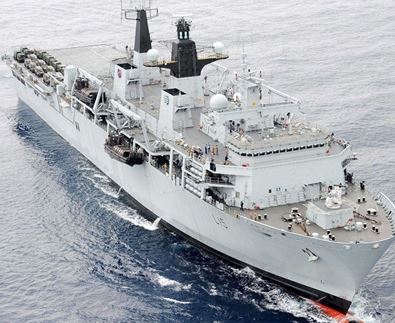As Spain and Argentina Team Up, Royal Navy Sets Sail for Gibraltar

Cougar 13
A significant chunk of the Royal Navy has set sail for the Mediterranean and the Gulf region on what is billed a “routine deployment”. The British fleet now underway is to engage in a long series of exercises – collectively known as Cougar 13 – with friendly navies to hone both skills and procedures.
The first task awaiting the Royal Navy is altogether slightly less amicable. A few of the warships are due for a port call in Gibraltar. HMS Westminster, a Type 23 frigate, and some Royal Fleet Auxiliary vessels will tie up to the rock in order to show the flag and remind the Spanish watching from across the bay that Britain has no intention to let go of this relic of former times.
Whilst all parties involved repeat ad nauseam that the port call was planned months ago and is a most mundane and routine affair, the visit comes at a time of heightened tensions between the UK and Spain.
The Spanish government refuses to back down on its earlier decision to sharply increase custom checks at to lone border crossing that connects Gibraltar to the Spanish hinterland. Thousands of mostly Spanish commuters now regularly see their patience tried with waits of up to seven hours. The checks are a tit-for-tat response to a fishing dispute.
“Whilst all parties involved repeat ad nauseam that the port call was planned months ago and is a most mundane and routine affair, the visit comes at a time of heightened tensions between the UK and Spain.”
Things are slowly getting out of hand. As Spain’s government mulls its next steps, Foreign Minister José García-Margallo is about to depart on a trip to South America for consultations with his Argentinean counterpart Héctor Timerman. Both Spain and Argentina pursue claims on British overseas territories.
Mr García-Margallo, not known for mincing words, is said to entertain thoughts of forming a common front with Argentina and taking the Gibraltar row to the United Nations. In fact Mr García-Margallo wants to give voice to his indignation from just about any rooftop: He now also considers legal action at the International Court of Justice in The Hague and possibly the EU’s own courts as well.
Over the weekend, Spanish Prime Minister Mariano Rajoy, beset by an escalating corruption scandal at home, said that his country is not engage in any nefarious scheming against Gibraltar and merely seeks to apply EU border regulations. While part of the union, Gibraltar lies outside the Schengen Area whose 26 members have abolished passport control at their common borders.
According to Mr Rajoy the border checks are not disproportionate and comply with all EU rules. However, in the same breath the prime minister let it be known that there is some wiggle room provided Britain agrees to talks on the status of its territory. In other words: the interpretation of EU rules may be relaxed once Britain decides to placate the Spanish.
Meanwhile the European Commission has acquiesced to a request from the Foreign Office in London to send a fact-finding mission to the territory. EU officials will arrive in early September and must determine if the border checks comply with regulations regarding the free movement of people as enshrined in the European charter.
The Gibraltar row is a typical case of much ado about nothing. Nearly all UK-Spain bilateral matters regarding Gibraltar were settled in 2006 after two years of negotiations in Córdoba. These Córdoba Agreements put an end to centuries of periodic flare-ups.
Spain’s Foreign Affairs Minister García-Margallo says he now wants to commit his country to a 180 degrees policy turn on Gibraltar. The minister’s motives for this monumental shift remain quite unclear, as does the objective of the exercise.
In the meantime, however, the Royal Navy may expect an exuberant welcome by the 30,000 or so residents of Gibraltar when its ships arrive in the famed harbour early next week.
You may have an interest in also reading…
OECD: Achieving a Resilient Economic Recovery
The recovery from the Great Recession has been slow and arduous, and has at times threatened to derail altogether. However,
World Bank: International Food Prices Hit Four-Year Low
New World Bank Group tool focuses on preparedness for potential future crises. International prices of food decreased by 6 percent
Laying Foundations for Renewed Growth — and a Secure Future
Health insurance is undergoing a ‘moment’ in Spain, and one dynamic company has its finger on the pulse. The health


















































































